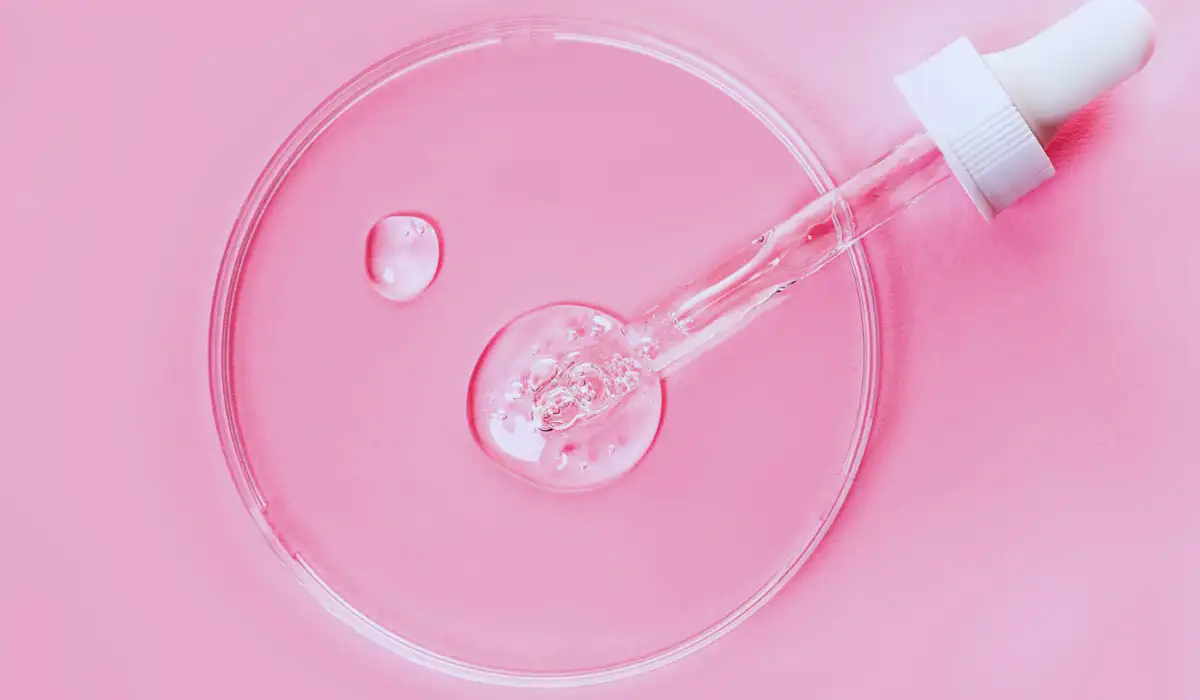Glycerine is a common ingredient in cosmetics. From soap to moisturizers, you can find it in almost every personal care product. This unassuming ingredient promises a luminous glow.
But, is the claim true?
Does Glycerine really make skin glow?
Join us as we explore the benefits of glycerin on the skin. We will understand the transformative potential of Glycerine through science-backed facts and unravel how it provides a radiant complexion.
But first, let’s clear up a confusion;
Glycerin or Glycerol – Are They Same?

When going through ingredients in skin care products, you might have come across similar-sounding ingredients – Glycerine and Glycerol. Often, there’s confusion about whether these terms represent the same ingredients or different.
Well, Glycerine and Glycerol are the same substance. It’s just that Glycerine is a more common term. But, since Glycerine is an alcoholic compound, Glycerol represents a more precise nomenclature.
In chemistry, alcohols include an -ol at the end. So, it doesn’t matter whether the packaging of a certain product says glycerine or Glycerol – the ingredients are the same.
What are the effects of Glycerine on the skin?
The American Academy of Dermatology Association lists several actions of Topical application glycerin. The product containing glycine improves the skin and makes it glow through the following action;
➡️ Hydrates the Skin
Glycerine is a humectant meaning it increases the water content in the skin and keeps it hydrated for a long time, due to its moisture retention capabilities.
Consequently, it effectively slows down water loss from the skin and prevents it from looking dry and dull.
➡️ Acts as an Anti-aging Agent For the Skin
Due to the hydrating properties of Glycerine, it has been found effective in the treatment of skin aging. It prevents skin damage and facilitates its repair.
On top of that, glycerin is also found effective in other skin conditions like xerosis, atopic dermatitis, etc. Glycerine is found to be well tolerated in people with skin conditions and has shown remarkable healing properties.
➡️ Repair the Skin Barrier
Skins act as a protective layer against environmental stressors, pathogens, and other harmful agents. It’s called the barrier function, but wear and tear over time can weaken the skin barrier and make it vulnerable to moisture loss, environmental pollutants, and irritants.
Glycerine is found to repair and reinforce the skin barrier. Due to its excellent hydrating properties, glycerine moisturizes the skin layer (stratum corneum) deeply.
This hydration is crucial to strengthen the skin’s protective barrier. Likewise, it also prevents water loss which reduces skin dryness and promotes a more resilient complexion.
➡️ Act as an Anti-Irritant On the Skin
Glycerine is also found to have an anti-irritant effect. Its ability to maintain hydration enables it to create a protective layer over the skin, thus insulating it from irritants. Likewise, its moisturizing properties soothe the skin and reduce the impact of potential irritants.
➡️ Accelerates the Wound-healing Processes
Besides being an essential component in skin care products, glycerine is also found in the compensation of many wound healing ointments.
It repairs skin by sucking out drainage and preventing exudates pools in the wound and surrounding areas. Besides, glycerine also promotes cell regeneration, assisting in wound closure.
How to Maximize Glycerine Benefits On Skin?
Glycerine is an effective moisturizing agent, however, you can maximize its benefits further. Follow these tips;
- Always pick a moisturizer that includes glycerine as an active ingredient in combination with other hydrating components too. It will amplify the effects of Glycerine and enhance the skin glow further.
- Glycerine works best when applied on damp skin. Since it locks the skin moisture – damp skin will offer glycerine a good surface to work up its hydrating magic.
- Layer glycerine-based products with other skincare items. Apply serum and toner along with glycerine before lotions or other heavier creams. It will enhance the hydrating properties of glycerine and moisturize the skin deeply.
- To maximize the effects of Glycerine, consistency is the key. Apply glycerine on a regular basis to enjoy its cumulative benefits on the skin.
- You can apply Glycerine with occlusive agents like Shea butter. This will help seal the moisture in the skin and offer a lasting effect.
Does Glycerin dry out the skin?
Besides its reputation as a potent hydrating agent, glycerine can also dry out the skin – these are contrasting facts and hard to believe. But, it’s true; too much glycerine can potentially dry out the skin and make it look dull.
To clarify things we have to deliver a bit deeper into the workings of glycerine. It’s a hygroscopic compound, meaning it attracts water like a magnet.
On top of that, glycerol molecules are too small compared to other humectant compounds like hyaluronic acid, therefore it penetrates deep into the epidermis.
In a dry and low humidity environment, or in high concentrations, glycerine, being a humectant, draws water from the nearest source, that is the skin. This can dehydrate the skin and may cause blistering in some individuals.
Quick tip: Glycerine content up to 10% is harmless. Anything above that will invert the hydrating action of glycerine and make skin more dry. In most skin care products, the glycerine content is usually within 3-5% which is well within the safe range, so no worries.
Conclusion
Glycerine is indeed a powerful skin moisturizing compound. In the right amount and combination with other moisturizing agents, Glycerine can keep your skin sufficiently hydrated which is necessary to keep it healthy and glowing.
The skin needs at least 20% water apart from other ingredients to make you look radiant and fresh.
But the best thing about Glycerine is it not only hydrates the upper layer but goes deeper into the skin and moisturizes all its different layers. It ensures that the moisture remains intact for a longer duration.
On top of that, the deep hydrating effect of Glycerine also improves elasticity and tightens the skin so that it looks young and shiny.
References
- Choudhary, V, et al. (2021). Glycerol improves skin lesion development in the imiquimod mouse model of psoriasis: Experimental confirmation of anecdotal reports from patients with psoriasis.
https://pubmed.ncbi.nlm.nih.gov/34445455/ - Milani M, et al. (2017). The 24-hour skin hydration and barrier function effects of a hyaluronic 1%, glycerin 5%, and Centella asiatica stem cells extract moisturizing fluid: An intra-subject, randomized, assessor-blinded study.
https://www.ncbi.nlm.nih.gov/pmc/articles/PMC5560567/ - Becker L, et al. (2019). Safety assessment of glycerin as used in cosmetics.
https://journals.sagepub.com/doi/full/10.1177/1091581819883820

